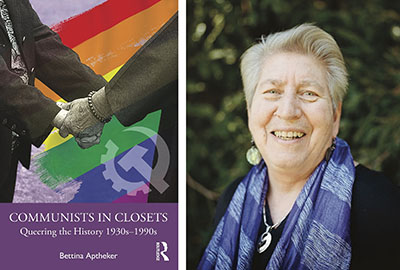Campus News
Bettina Aptheker: Exploring the complicated history of LGBT people in the Communist Party
Beloved emeritus professor Bettina Aptheker to discuss new book, Communists in Closets, at free event October 25 at UCSC’s Cowell Ranch Hay Barn

For more than four decades, Bettina Aptheker, UC Santa Cruz Distinguished Professor Emerita, gave UCSC students an unforgettable immersion in feminist history.
Aptheker has developed a large and loyal following over the years. Her intro to feminist studies class spanned disciplines and genres to give students an intellectual and consciousness-raising experience that has been described as “life-changing” and “mind-expanding.”
Aptheker embodies her credo “the personal is political” in her books as well as her courses, and her latest work, Communists In Closets: Queering the History 1930s–1990s (Routledge) is already drawing rave reviews.
On October 25, at 7 p.m., Aptheker will read from this book at the Cowell Ranch Hay Barn near the base of campus, and take part in a discussion focusing on her life of adventurous activism. The event is presented by The Humanities Institute at UCSC and Bookshop Santa Cruz.
The event is free and open to the public but seating is limited so advance registration is required. Sign up here to reserve your spot. Mask-wearing is mandatory for this event.
UCSC Humanities Dean Jasmine Alinder describes Aptheker as “one of the leading feminist scholars, recognized for building the Feminist Studies program at UCSC. But she is also a master storyteller and a great communicator who works across disciplines. In her classes she would draw not just from scholarship but from art, poetry, videos, and music.
“Her books, like her classes, are a testament to the fact that the personal is political,” Alinder said. “In the past few years that’s become an academic catchphrase, but Aptheker pioneered this way of thinking. Her books are more than just portraits of historic periods. They also talk about the human impact—what it is like to put your life on the line for what you believe.”
A history of exclusion, defiance, and bravery
Aptheker’s book covers the fraught and complex history of LGBT people in the Communist Party, which banned them from membership starting in 1938, and even cast them off as “degenerates.” In fact the exclusionary policy lasted until 1991 when the Party split after the Soviet Union collapsed.
Because of the ban that lasted for six decades, the gays and lesbians who supported the party had to stay in the closet. To contemporary readers, such exclusionary practices may seem surprising or even shocking, considering the party’s groundswell of popularity—it had close to 100,000 members by the 1930s—and because of its embrace of causes strongly associated with progressive politics including anti-racist organizing.
Gays and lesbians were very closeted in general in the 1930s and 1940s, and certainly closeted within the Communist Party during the six decades in which they were banned from membership, Aptheker said.
But there were important complications that added depth and nuance to this story. For instance, the Communist Party, in spite of its homophobic stance, had members who were brave enough to stand up for lesbian and gay liberation, defying the homophobic status quo. In the process, those leaders contributed to the political and philosophical underpinnings of those movements.
Aptheker started working in archives to research Communists in Closets in 2010 during her one-year sabbatical. “In the course of the decade I continued archival work whenever I had a break from teaching,” she said.
Aptheker also drew freely from her own memories. “Because I had been closeted myself in the Communist Party in the 1960s and ‘70s, I had some ideas about who and what to look for in my research,” she said.
“A desire for freedom”
The book is newly released but it’s already receiving warm praise from distinguished scholars and authors such as Sarah Schulman, author of Let the Record Show: A History of ACT UP New York, 1987–1993 (2021).
“Bettina Aptheker’s personal history of gay and lesbian people and the Communist Party is essential and transformative in enlightening our understanding of gay, Black, and women’s liberation visions in America,” Schulman writes. “She shows how queer desires for freedom were so expansive that they were propelled by both the party’s political visions of justice and the cruelties of its organizational prejudices to create entirely new liberation formations.
“Aptheker traces the invention of Gay Liberation in America, the first Women’s Studies class, the founding of Parents of gays solidarity organizations, lesbian music, and the first play by a Black woman on Broadway—all sprouting from queer Communist origins,” Schulman continues. “This is a book that makes connections and fills gaps, defies stigma, and defies historical silence.”
Mary Helen Washington, Distinguished University Professor of English at the University of Maryland, College Park, and author of The Other Blacklist: The African American Literary and Cultural Left of the 1950s, called the book “at once a deeply personal portrait of Bettina Aptheker and her struggles as a gay woman in the Communist movement, but also a generous, appreciative and carefully historicized portrait of the many others who were gay, feminist, and Communist. The chapter on Lorraine Hansberry is especially enriched by Aptheker’s triple vision.”
Aptheker is also the author of Intimate Politics: How I Grew Up Red, Fought for Free Speech and Became A Feminist Rebel (2006); and The Morning Breaks: The Trial of Angela Davis (1976; second edition 1999).
Aptheker, who received her Ph.D. in History of Consciousness from UC Santa Cruz, has been honored with the Award for Excellence in Education by the California chapter of the National Organization for Women. She was recently named a prestigious University of California Presidential Chair in Feminist Critical Race and Ethnic Studies at UC Santa Cruz, and is currently teaching an online course on feminism and social justice.
Advance reservations are required for this event and seating is limited so reserve your spot in advance here.